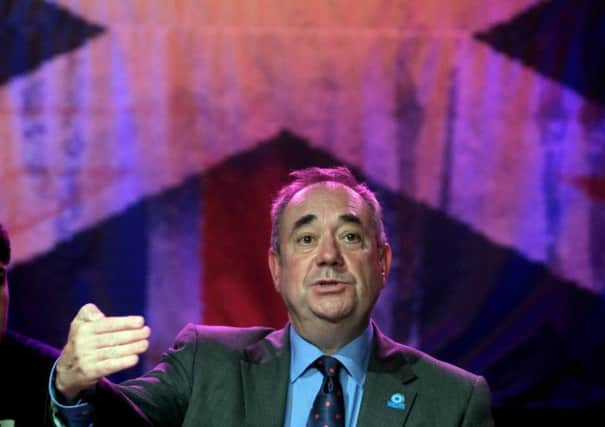Yes vote advancing despite currency fears - poll


An exclusive opinion poll for Scotland on Sunday, published just one month before the crucial vote, reveals that support for independence still lags behind the No vote, but has risen by 4 percentage points since last month to 38 per cent.
Advertisement
Hide AdAdvertisement
Hide AdOver the same period, support for a No vote has risen two percentage points to 47 per cent, as the percentage of undecided voters fell 7 percentage points to 14 per cent.
When undecided voters were stripped out of the equation, the ICM poll found that support for No stood at 55 per cent, a decrease of two percentage points on last month, while support for Yes stood at 45 per cent, an increase of two percentage points.
When further analysis was conducted on the 14 per cent who were still undecided, the pollsters found these “don’t knows” were more likely to vote No by a ratio of 2:1.
At a time when Salmond’s controversial plans to keep the pound are under intense scrutiny, the poll asked its sample of 1,005 adults across Scotland what they thought of his currency policy. More than half (52 per cent) said they thought the Scottish Government’s currency plans were “unconvincing”. Just 26 per cent of the sample were convinced by the currency plans. The remaining 22 per cent were undecided.
The SNP’s failure to win over the public on its economic policy was reflected by the poll’s verdict on who had come out on top in the first televised debate of the campaign between Salmond and the Better Together leader Alistair Darling.
The sample was asked about the STV debate, which saw Salmond repeatedly rule out disclosing his Plan B alternative to keeping the pound in a formal currency union. Forty-two per cent of those asked believed Darling had won the STV debate, compared with just 19 per cent who thought that Salmond had emerged victorious. The remaining 39 per cent said they did not know who had won.
The poll is published on the eve of a Scottish Cabinet visit to Arbroath, marking exactly one month before Scotland goes to the polls. Salmond and his ministers are travelling to the seaside town where the Declaration of Arbroath was signed in 1320 in a highly symbolic move that recalls the historic document signed by Scottish nobles rejecting English rule.
Last night, independence campaigners welcomed the rise in Yes support. Blair Jenkins, chief executive of Yes Scotland, said: “This is a very encouraging poll – putting Yes support up by four points in a month. Yes is continuing to gain ground and success on 18 September is within Scotland’s reach. The poll also shows that among those who were undecided last month and have now made up their minds, they have come to Yes by a margin of two to one.
Advertisement
Hide AdAdvertisement
Hide Ad“Scotland is one of the wealthiest countries in the world. More and more people are agreeing with us that only with independence can we make that enormous wealth work better for all the people who live and work here.”
Although the No side appeared to be winning the argument on currency, the rise in Yes support lends credence to those who believe issues other than the economy will come into play. The results suggest that Better Together, which has focused relentlessly on the economy, has much work to do on other aspects of the debate.
Despite Darling’s success in taking on Salmond on the currency, the No campaign has been criticised for failing to offer a positive vision of Scotland within the United Kingdom. Better Together has also been attacked for failing to appeal to the hearts of voters, to whom questions of national identity, patriotism and their gut feelings come into play on 18 September.
The poll also suggested that Better Together’s assurances that a No vote would secure more powers for the Scottish Parliament is failing to make much ground with the public.
Forty-one per cent of those questioned thought that a No vote would see a stronger Holyrood – up just one percentage point on last month.
For Better Together, there was encouragement that the rise in Yes support – which was calculated using weighting that took a person’s likelihood to vote into account – did not amount to a game-changing break-through. Yes Scotland had hoped that Salmond’s televised encounter with Darling would trigger a surge in support.
Last night a Better Together spokesman said: “With just two weeks to go until up to a million people cast their referendum vote by post, people are realising that Alex Salmond and the SNP cannot even answer basic questions like what currency we would use if we walked away from the UK.
“The currency matters. It matters to our jobs. It matters in terms of how much we pay for our rent and our mortgage and it matters to our pensions, savings and benefits.
Advertisement
Hide AdAdvertisement
Hide Ad“This poll shows people are rejecting, by a margin of two to one, the risk and uncertainty of independence. If we say No thanks, we can have the best of both worlds in Scotland: a strong Scottish Parliament with more powers guaranteed and the strength, security and stability of the UK.”